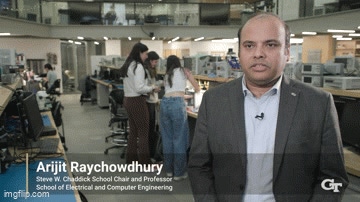AI Makes Mark on Engineering Education
Supercomputer hub will train students in AI at prominent engineering school.

With AI likely to be a key part of the skillset for future engineers, one well-known engineering school, Georgia Institute of Technology, has developed an AI Makerspace, an artificial intelligence supercomputer hub dedicated exclusively to teaching students. The hub was launched in collaboration with AI chipmaker Nvidia.
The AI Makerspace hopes to offer computing resources typically prioritized for research to deepen Georgia Tech students’ AI skills and shape future generations of AI systems professionals. The Makerspace is a dedicated computing cluster paired with NVIDIA AI Enterprise software that students can access online. The software technology resides on an advanced AI infrastructure that was designed, built, and deployed by Penguin Solutions, providing a virtual gateway to a high-performance computing environment, not unlike those used by researchers in higher education and the workplace.
Powerful Nvidia Hardware
Far from using older hand-me-down or scaled-down hardware, Georgia Tech will deploy state-of-the-art hardware in the hub. The first phase of the endeavor is powered by 20 NVIDIA HGX H100 systems, housing 160 NVIDIA H100 Tensor Core GPUs (graphics processing units), one of the most powerful computational accelerators capable of enabling and supporting advanced AI and machine learning efforts.
Nvidia will offer students and faculty support through its Deep Learning Institute resources, including faculty-run Nvidia workshops, certifications, a university ambassador program, curriculum-aided teaching kits, and a developer community network.
The AI Makerspace expands on Georgia Tech’s foundational, theory-focused AI curriculum by offering students a hands-on platform to tackle real-world AI challenges, develop advanced applications, and present their AI-driven ideas at scale. It also complements two recent “AI for Engineering” announcements by the College: the unveiling of Georgia Tech’s first minor degree program in AI and machine learning, and the re-imagining and creation of 14 core AI courses for undergrads.
“The AI Makerspace represents a significant advancement in technology for education,” explains Arijit Raychowdhury, professor and Steve W. Chaddick School Chair of Electrical and Computer Engineering. “To draw a comparison, the makerspace will provide a technological upgrade equivalent to switching from an etch-a-sketch to an iPad. That’s the level of difference in technology that the AI Makerspace provides students.”
Geared Toward Undergrads
Undergraduate students currently enrolled in ECE 4252: Fundamentals of Machine Learning (FunML) are accessing the Georgia Tech AI Makerspace to learn, experiment, prototype, and showcase their AI-driven ideas at scale. This fall, the AI Makerspace will be incorporated into the curriculum of all eight schools in the College of Engineering.
By spring 2025, all Georgia Tech engineering students — both undergraduate and graduate — will have access to non-instructional learning. In 2026, Georgia Tech plans to set up the AI Makerspace Omniverse, a sandbox for augmented reality (AR) and virtual reality (VR). The education and research hub is based on NVIDIA Omniverse, a platform for connecting and developing 3D tools and applications, and will be available to all students.
Beyond traditional computing, the hub is designed to be utilized in each of Georgia Tech’s six colleges, with a unique emphasis on human-AI interaction. By doing so, the hub ensures that AI is viewed as a transformative force, encouraging innovation that extends beyond the confines of a single field.
About the Author(s)
You May Also Like





